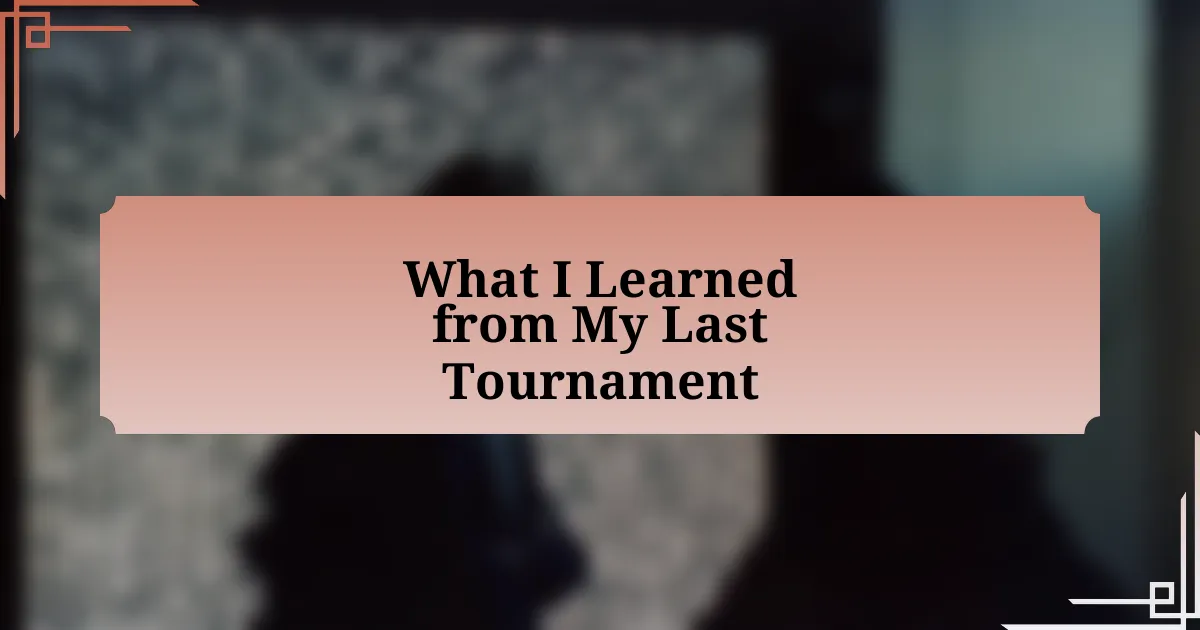Key takeaways:
- eSports tournaments create a unique blend of competitive spirit and community, emphasizing the importance of environment and logistics on performance.
- Experiences from tournaments foster personal growth, adaptability, communication skills, and resilience through interaction and analysis of gameplay.
- Effective practice requires focused techniques like deliberate practice, reviewing gameplay, and collaborating with diverse players to enhance skills.
- Post-tournament analysis, including reviewing replays and holding team debriefs, is crucial for identifying areas of improvement and applying insights for future competitions.
Author: Evelyn Hartley
Bio: Evelyn Hartley is an award-winning author known for her compelling narratives and richly drawn characters. With a background in psychology and literature, she weaves intricate tales that explore the complexities of human relationships and the intricacies of the human psyche. Her debut novel, “Whispers in the Dark,” was celebrated by critics and readers alike, earning her a dedicated following. Evelyn’s work has been featured in various literary journals and anthologies, and she frequently speaks at writing conferences and workshops. When she’s not writing, she enjoys hiking in the mountains and volunteering at her local animal shelter. She resides in Seattle with her two rescue dogs, Luna and Milo.
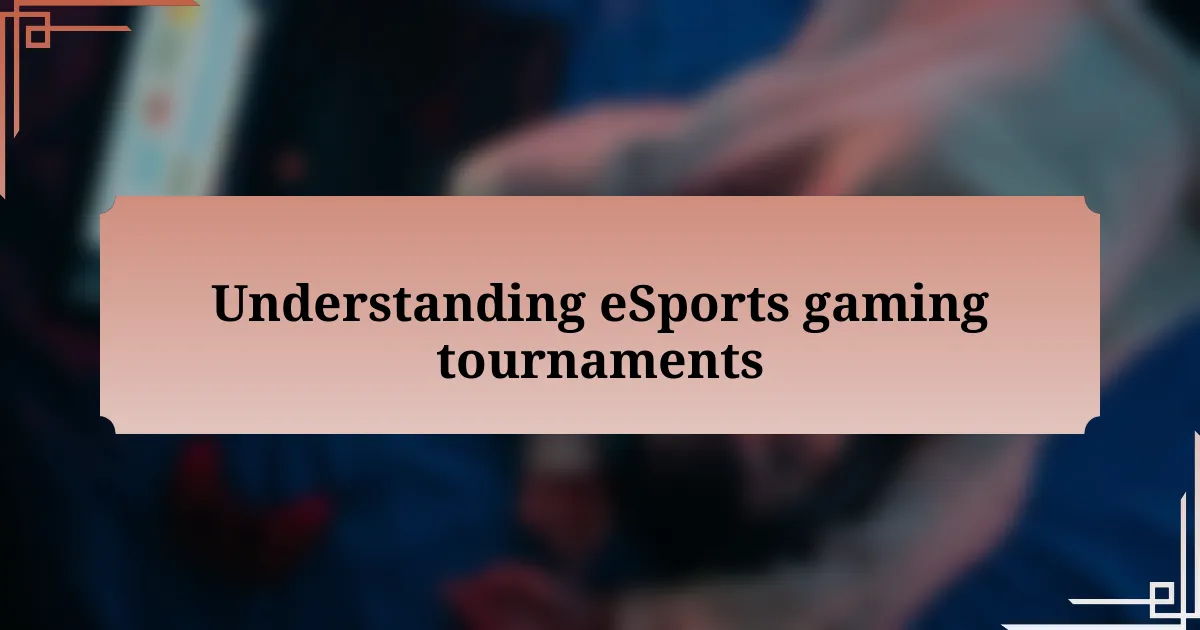
Understanding eSports gaming tournaments
eSports gaming tournaments are fascinating spectacles that bring together players from around the world. I remember my first tournament vividly—the adrenaline rush, the sounds of players clicking furiously at their keyboards, and the palpable tension in the air. It’s a different environment, one that blends competitive spirit with a sense of community; doesn’t that make you wonder about the powerful connections formed in such high-stakes situations?
As I dove deeper into the tournament scene, I started to realize just how varied these competitions can be. From local events in small gaming cafes to massive championships streamed live to millions, each tournament has its own unique vibe. Have you ever experienced the thrill of live commentary? It’s electric; the way the commentators analyze every play adds a whole new layer to the watching experience.
The logistics of organizing an eSports tournament can be daunting, yet it’s crucial for creating an unforgettable experience for players and fans alike. Planning the format, scheduling matches, and ensuring fair play are just the tip of the iceberg. Reflecting on my own tournament experiences, I often think about how every detail—from the venue’s lighting to the refreshments—can significantly impact a player’s performance. Isn’t it incredible how the smallest elements can shape the outcome in such a competitive environment?
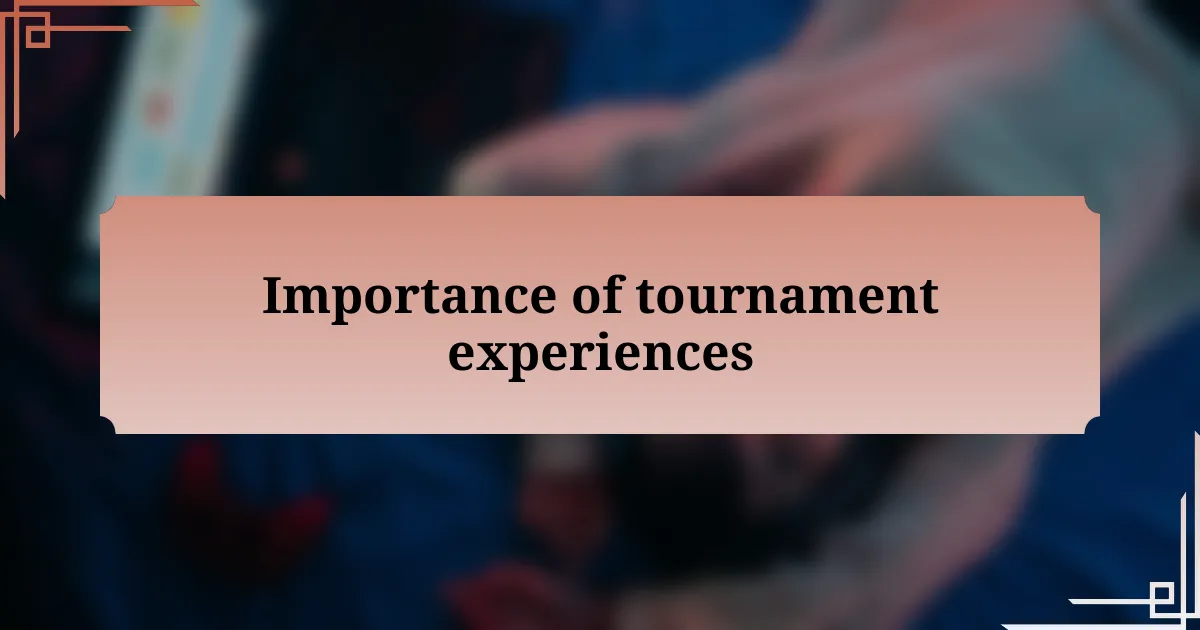
Importance of tournament experiences
The experiences gained from participating in tournaments are invaluable; they are not just about winning or losing. For me, every match served as a classroom where I learned more about my strengths and weaknesses. Have you ever faced a particularly tough opponent and realized that your usual strategies weren’t sufficient? That moment of realization can propel growth in ways you might not expect.
What I cherish most about tournament experiences is the opportunity to meet and interact with diverse players. During one event, I found myself having an insightful conversation with a player from another region, sharing tactics and insights that truly broadened my perspective. This exchange reinforced the reality that gaming transcends borders; it’s a shared passion that fosters camaraderie and collaboration.
Additionally, the environments of these tournaments can be intensely immersive. I recall the way my heart raced as the crowd cheered during a clutch moment in a match. That energy can be both intimidating and motivating; it reminds you of the collective spirit surrounding competitive gaming. Isn’t it fascinating how such experiences can ignite a deeper love for the game?
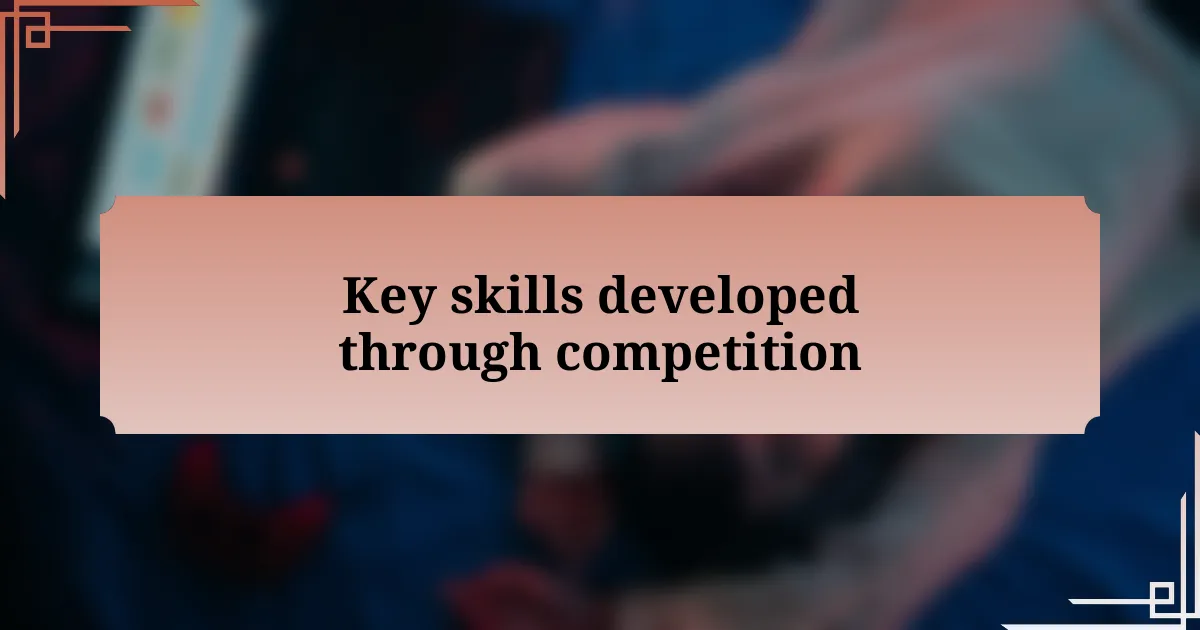
Key skills developed through competition
Throughout my time in tournaments, I’ve pinpointed the importance of adaptability. I remember one particular match where my initial game plan fell flat, and I was forced to think on my feet. It was in that moment of crisis that I discovered my ability to adjust strategies mid-game, which has since become a crucial skill in my arsenal.
Communication is another key skill that developed through competition. I’ve always been a quiet player, but during team matches, the need for clear and precise communication became apparent. There was a moment when my teammate and I executed a flawless ambush, all because we understood each other’s cues. It struck me how vital it is to articulate thoughts quickly and constructively; this connection is essential in achieving victory.
Lastly, resilience stands out as a vital trait I’ve honed over time. After losing an intense semifinal match, I felt the sting of disappointment wash over me. Yet, instead of dwelling on that loss, I took it as an opportunity to reflect on my gameplay. This mindset shift transformed setbacks into stepping stones for improvement, reminding me that true growth often springs from hardship. Have you ever turned a defeat into a lesson? It’s a powerful realization that fuels further motivation.
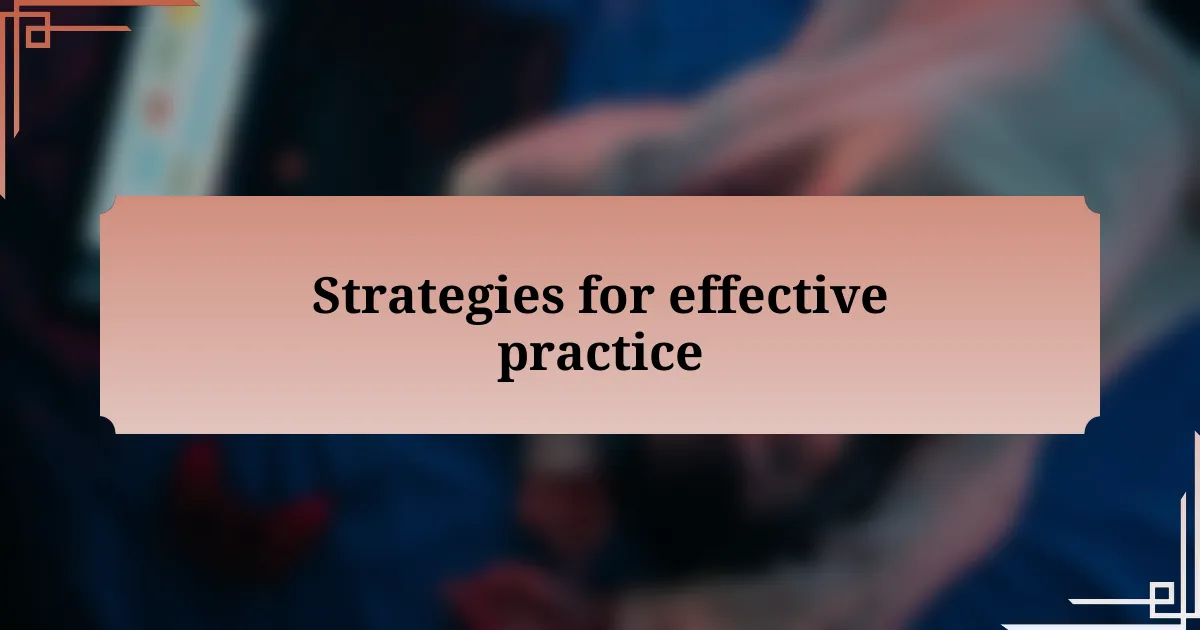
Strategies for effective practice
Effective practice in eSports is about more than just grinding hours. I’ve found that breaking my practice into focused chunks yields the best results. It’s a technique known as “deliberate practice,” where I concentrate on specific aspects of my gameplay, like aiming precision or strategy application. This approach keeps my sessions fresh and prevents burnout, allowing me to absorb more information in each practice round.
Another strategy that has worked wonders for me is integrating review sessions into my practice routine. After every match, I take some time to analyze my gameplay, often with replays. For instance, I vividly recall reviewing a particularly tough loss where I missed crucial opportunities. Watching the replay, I spotted mistakes I didn’t notice during the match. This self-awareness not only helps me correct my gameplay but also cultivates a deeper understanding of tactics and decision-making processes. Have you ever taken the time to dissect your plays? It can uncover patterns that lead to massive improvements.
Lastly, I’ve learned the value of collaborating and practicing with a diverse group of players. Teaming up with players of varying skill levels challenges me to adapt and enhances my gameplay. I remember a session where a new teammate brought unconventional strategies to the table, pushing me out of my comfort zone. As I experimented with these techniques, I discovered new tactics that I now apply in competitive scenarios. Engaging with others not only expands my skill set but also offers fresh perspectives on the game’s mechanics. Isn’t it fascinating how collaboration can open doors to strategies we might never have considered?
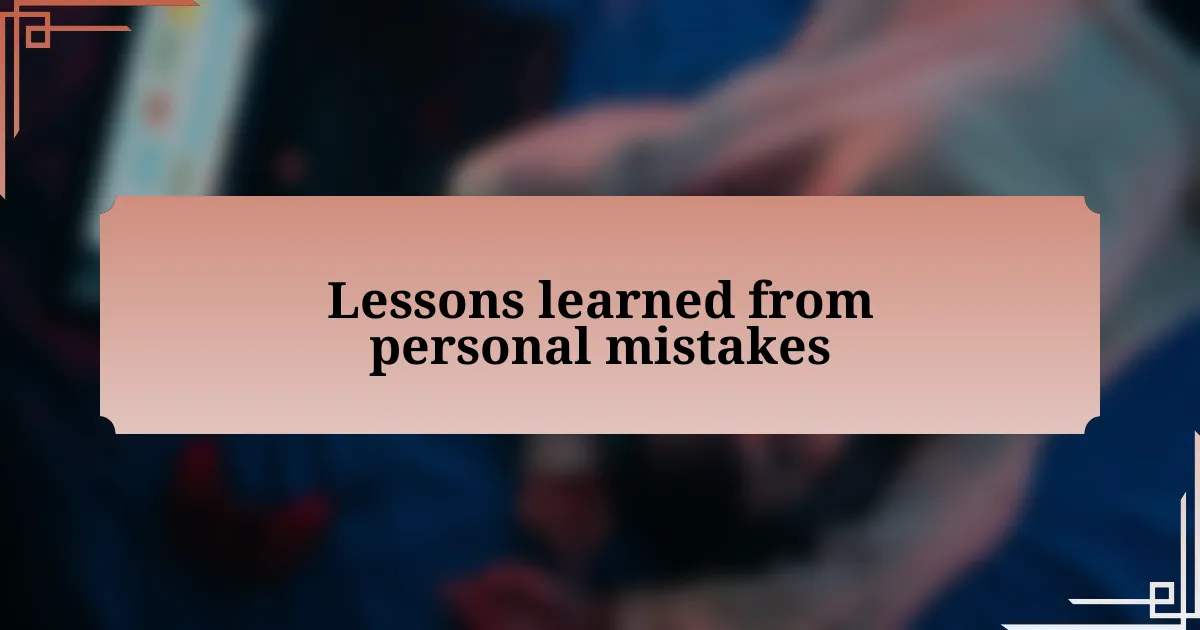
Lessons learned from personal mistakes
In my last tournament, I faced a moment where impatience got the better of me. During a crucial match, I rushed into a fight without adequate information about the enemy’s position. I felt the adrenaline; it was exhilarating, but I ended up losing my character early. That mistake haunted me for days—I realized that a moment of patience could change the game.
Reflecting on my errors, I recognized that communication with my teammates had faltered. There was a pivotal moment when a coordinated strategy could have turned the tide in our favor, but instead, we were scattered and confused. I could feel the frustration building, not just in myself but in my teammates too. From that experience, I learned just how vital clear communication is; it’s a lesson I now prioritize above all else.
One particularly painful lesson involved not reviewing my team compositions effectively. I recall a match where our team lacked synergy, leading to a quick elimination. It felt like I had let everyone down. Now, I make it a point to analyze not only my gameplay but the dynamics of our team before every match. This mistake has taught me that understanding how different characters complement each other can be the difference between victory and defeat. Have you ever failed to see the bigger picture? It’s a hard lesson, but one that ultimately shapes us for the better.
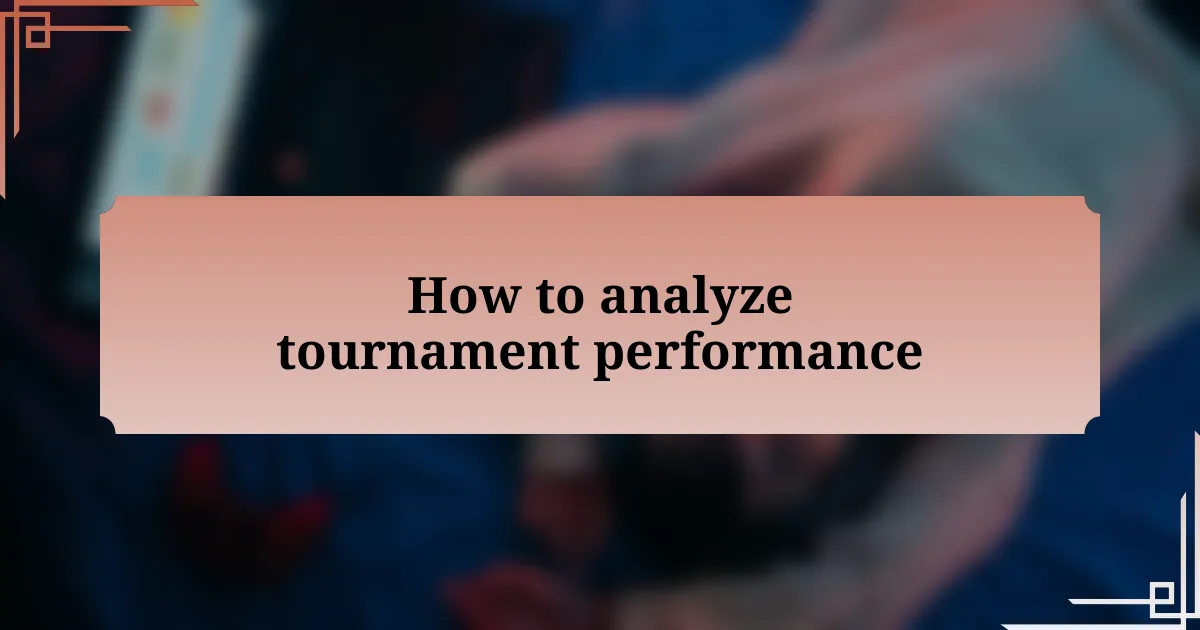
How to analyze tournament performance
Analyzing tournament performance is crucial for growth, and I’ve found that reviewing replays is one of the best methods. After my last tournament, I spent hours watching the footage of our matches. I was shocked at the missed opportunities I easily overlooked in the heat of the moment. Have you ever felt that pang of realization when you catch a mistake in hindsight? It’s a reminder of how much detail there really is to consider.
Beyond watching replays, I also took a detailed look at statistics from each match. Comparing kill-death ratios and objectives secured helped me understand where we fell short. There were moments when I thought we performed well, but the numbers told a different story. This wasn’t easy to accept; admitting shortcomings can be tough, but it’s essential for improvement. Have you ever cringed at your own stats? It’s part of the learning process that ultimately drives us forward.
Lastly, I began to hold debrief sessions with my team. Engaging in open discussions about each match revealed insights I hadn’t considered. I remember a teammate pointing out our lack of focus during critical moments that I hadn’t noticed at all. It was enlightening and, honestly, a bit humbling. How often do we truly listen to our peers? Their perspectives can illuminate blind spots in our gameplay that we may not see ourselves.
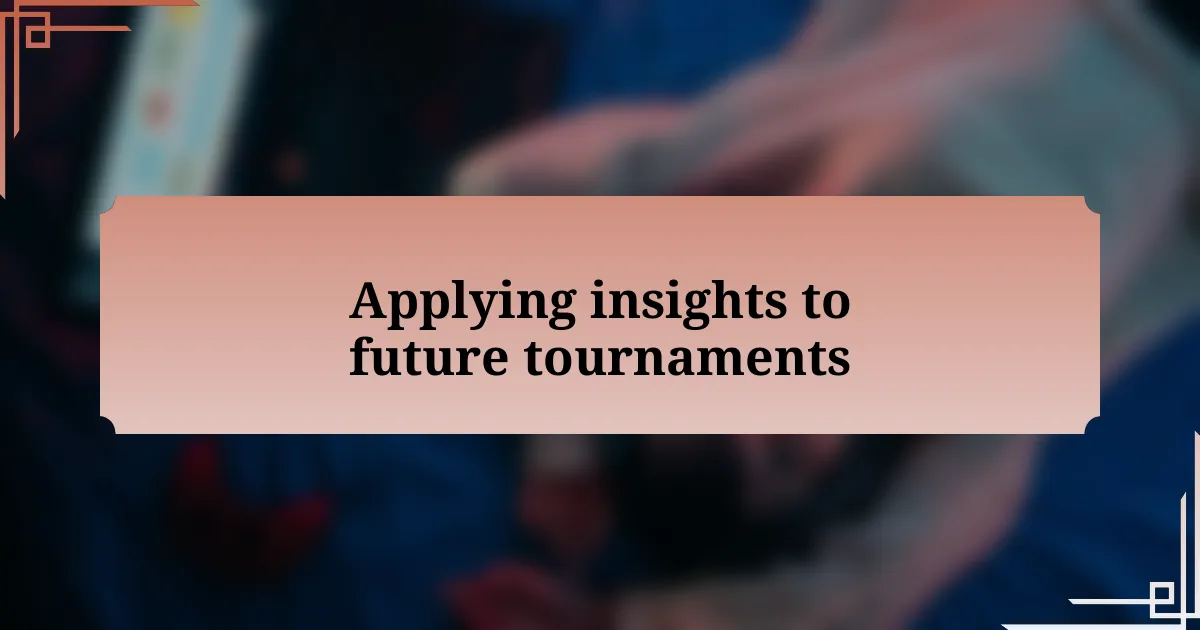
Applying insights to future tournaments
Applying what I’ve learned from analyzing my performance in the last tournament has become essential for preparing for future competitions. For instance, I started mapping out specific strategies based on my performance metrics. I remember the moment when I realized that we consistently struggled against a particular team composition. It was frustrating at first, but using that insight, I crafted strategies to counter similar setups in our next tournament. Have you ever changed your approach after recognizing a pattern?
Another vital aspect I’ve embraced is refining my mental approach. After that last tournament, I recognized the toll that pressure can take on focus. I implemented mindfulness exercises into our practice routine, aiming to cultivate a calm mindset even in heated moments. It’s fascinating how a simple breathing technique can shift your perspective during a high-stakes match. Isn’t it amazing how the mind can transform our gameplay?
Moreover, I’ve started to set specific, measurable goals for myself and the team. Instead of vaguely aiming for ‘better performance,’ I focus on concrete areas for improvement. During our last practice session, I set a goal for enhancing communication during team fights. As we actively tracked our progress, I felt a new sense of accountability among my teammates. What small changes could make a big difference in your game? It’s those incremental adjustments that often lead us to significant breakthroughs.

